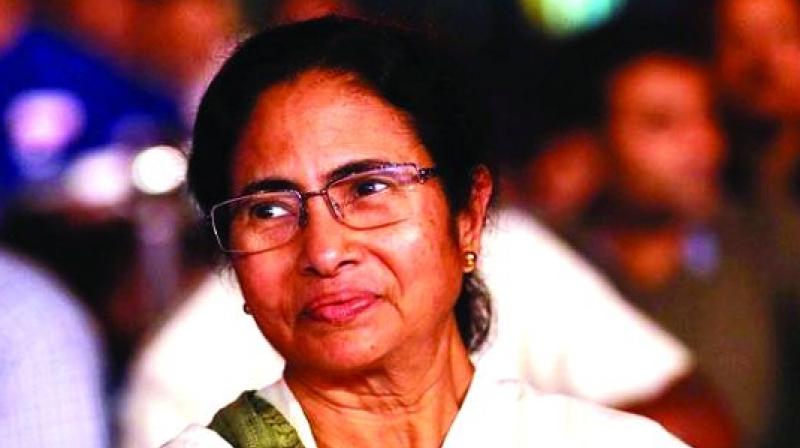Didi needs to shift, offer Bengal a brighter future

Harried and heckled by saffron brigade demonstrators, “Jai Shri Ram!” chants ringing like an aggressive war cry in her ears, West Bengal chief minister Mamata Banerjee needn’t expect much peace between now and the state’s 2021 Assembly elections. If there is no immediate reason to fear “regime change” in Kolkata, that is mainly because the Centre doesn’t yet have the political manpower to replace the Trinamul Congress government.
In West Bengal more than anywhere else, the Bharatiya Janata Party has exposed itself as a party of, for and by Hindus. It promises the circus of religion instead of the bread of a thriving economy. Dismissing the BJP’s appeal as “just Hindutva, nothing else”, Kamal Nath, the Madhya Pradesh chief minister, who grew up in Kolkata, added: “Once people decide they are voting as Hindus, they forget everything else.” He might have said this is especially so when neurotic fears of illegal Bangladeshi and Rohingya migrants are deliberately built up. The Lok Sabha election sharply increased religious polarisation, which is a constant threat to peace and stability.
Given the logic of numbers, any contest between the BJP and the Trinamul Congress will be swiftly decided in the former’s favour. The BJP is backed by the Centre’s power and authority. About 40 per cent of Kolkata’s population is Hindi-speaking and instinctively belong to the BJP’s constituency. They include some of India’s richest Marwari trading families who are based in Kolkata. A secular Trinamul Congress frantically courting minority Muslims has no chance against the juggernaut of these forces that the BJP spearheads.
But the Lok Sabha results, when the BJP swept 18 seats (from only two) while its share of the popular vote spiralled from a mere 27 per cent in 2014 to 40 per cent, was less a positive welcome to the BJP, which is still an “outsider” in the state, than a mark of disappointment with the home-bred Trinamul Congress’ failures. Ms Banerjee has already done much to improve village life (roads, electrification, potable water) but tales of corruption and extortion are rife. While she herself is above suspicion, that is not said about some of her protégés. Above all, she has done nothing to safeguard young Bengal’s future.
The Left Front was routed after 34 years in power principally because it could not meet the middle class, white collar aspirations of young Bengalis who had benefited from the Left Front’s land reforms, agricultural wages policy and education system. By driving Tata Motors out of Singur and failing to attract new investors, the Trinamul Congress has only helped and furthered the stagnation that gripped post-Left Front West Bengal. If Ms Banerjee wants to save her crumbling citadel, she must unite all Bengalis behind her party with a rational economic programme that inspires public confidence and encourages investment while creating jobs.
Voters know now that looking to the BJP for employment may not lead anywhere. It is no secret that the saffron party suppressed its own abysmal record to fight the elections, and that all-India unemployment, especially of people in the 24-34 age group, is at a 45-year high. Nor can they expect much by way of dynamic administration from the state’s unknown ragtag bunch of new BJP leaders. Perhaps even Amit Shah recognises this, for there could have been no more definitive dismissal of the West Bengal results than the two junior ministerships bestowed on Babul Supriyo, an engaging but lightweight entertainer with a chequered past who was already in Narendra Modi’s first government, and an unknown young woman from North Bengal, Debasree Chaudhuri, who is now minister of state for women and child development. Mr Supriyo has won again from Asansol, defeating the well-known actress Moon Moon Sen by 1.97 lakh votes. But he remains no more than a colourful fringe figure whose latest claim to notoriety is to have got into an altercation with the Trinamul Congress mayor of Asansol.
Although the BJP is a lineal descendant of the Bharatiya Jan Sangh, which was founded by a proud son of Bengal, Shyama Prasad Mookerjee, Bengalis saw the party as a symbol of the Hindi-Hindu cow belt. Perhaps the only BJP politician from West Bengal ever to be at all seriously regarded is Tathagata Roy, an engineer of some standing, who held responsible administrative positions. Mr Roy’s must have been a lonely vigil in trying to keep the unpopular saffron flag flying among indifferent or disdainful Bengalis, and he probably gave up all hope of making a political mark in West Bengal since he accepted a gubernatorial position in 2015 and hasn’t looked back since.
Now, the statewide disappointment with the Trinamul Congress may give some new hope to the BJP as it accuses Ms Banerjee of pampering Muslims. With her hijab, namaz and “Khuda Hafiz”, she did succeed in winning over 70 per cent of the state’s Muslim voters, against only 40 per cent in 2014. But there are just not enough Muslims to tip the balance. Her latest mistake was to appoint Firhad (Bobby) Hakim, a Muslim politician with no municipal experience, as mayor of Kolkata. Before that she announced stipends of Rs 2,500 and land for house construction to 30,000 imams and muezzins. Though the courts struck down this largesse, people suspect that she found circuitous ways of making the payments. Possibly realising the political folly of markedly patronising Muslims, she recently got Mr Hakim to promise Rs 380 to Brahmin priests per corpse at the cremation ghat, but this was too little, and too late.
She must make up for it now with a thriving economy and an abundance of jobs for an army of impatient youths who don’t really care much about Shri Ram but are ready to use him, and every other deity and icon, to buttress their demand for economic advancement. She can still prove that Bengali disappointment with the Trinamul Congress is not a permanent rift.

